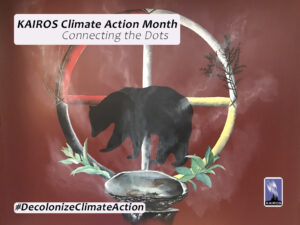Connecting the dots

Remember connect-the-dots pictures? Many are incredibly simple (like this bunny) – the image sometimes could even be discerned without drawing the lines between dots. But some pictures are much more complicated, with the picture emerging from all those unconnected points on the page only after careful effort.
While climate action is daunting and complicated, decolonizing climate action is even more complicated. But that makes it even more necessary. Scan through the blogs and resources from Climate Action Month 2022 – topics have covered diverse and intersecting concepts of climate justice, Indigenous rights, environmental racism, the fossil-fuel nonproliferation treaty, climate as a peace issue, decolonizing the church, corporate accountability, our ecological debt, and more. Other blogs have introduced the delegates KAIROS and For Love of Creation will send to the UN Conference on Climate Change (COP27) in November. Look back and listen to what KAIROS’ global partners and the Indigenous delegates have to say. Truly hearing what they voice is one part of how we decolonize.
All the topics listed above are linked by a theme. Colonialism created a political-economic system that undergirds most efforts related to climate policy now. Colonialism produced racism and subordinated many voices – most of whom are still muted now. Climate policy still tries to replicate that existing system by driving climate action in directions that inadequately address the rights, needs and solutions of nations and people underrepresented at the negotiating tables – that’s colonialism still in action.
For example, the reports by Indigenous Climate Action (ICA) remind us that Canadian and international climate efforts ignore the realities of Indigenous communities and fail to address structural inequities. Climate negotiations at all levels allow for the continuation of fossil fuels, which the ICA reminds readers is “a primary source of GHG emissions and a major contributor to rights violations” in Canada and around the world. Under a colonial system, the Canadian federal government controls First Nations finances and there is little discussion of the land or returning control of land to Indigenous peoples.
The current system has created a lot of damage. It increases the risks to women’s peace and security, which is flagged by partners of KAIROS’ Women Peace and Security program. It allows for sacrifice zones as resources are extracted with little regard for human rights, Indigenous rights, or environmental protection. It undermines the dignity of migrants, especially those who might be climate refugees. Climate change efforts must include the recognition of climate refugees as well as the rights, regularization and status for all migrants.
This system needs to be replaced. Even the IPCC acknowledges the need for social transformation. But we hear so little about climate justice issues in the mainstream media and from politicians and governments and even less about the need for this radical transformation.
When we act, we act in hope of a more just world where everyone has the same opportunities to flourish.
What can each of us do? It begins with operating at different levels – personal, local, community, and governmental. At the personal level: Learn, pray, advocate! You can demand more from the government. Write your MPs in support of the bills on environmental racism and corporate accountability.
Advocate for municipalities to include equity and justice in their climate plans, and endorse the fossil-fuel nonproliferation treaty.
Talk about what you are doing and why you are doing it, because that will have an impact in your circles of influence including your significant others. It will challenge and help change social norms and structures that both contribute to the climate crisis and undermine solidarity with the majority world.
Join with others in KAIROS regional groups or other organizations to help maintain your enthusiasm and so that your voices are amplified by acting together.
The dots connect. We won’t have a good picture of what that better, more just world will look like until climate action is decolonized and once-excluded voices share positions of power in negotiations. As we act for decolonized climate action and policy, we begin to discern that future, and a better and more just world emerges.
The image is from a mural by Connor Sarazin entitled: Spirit of the 7 Grandfather Teachings.
